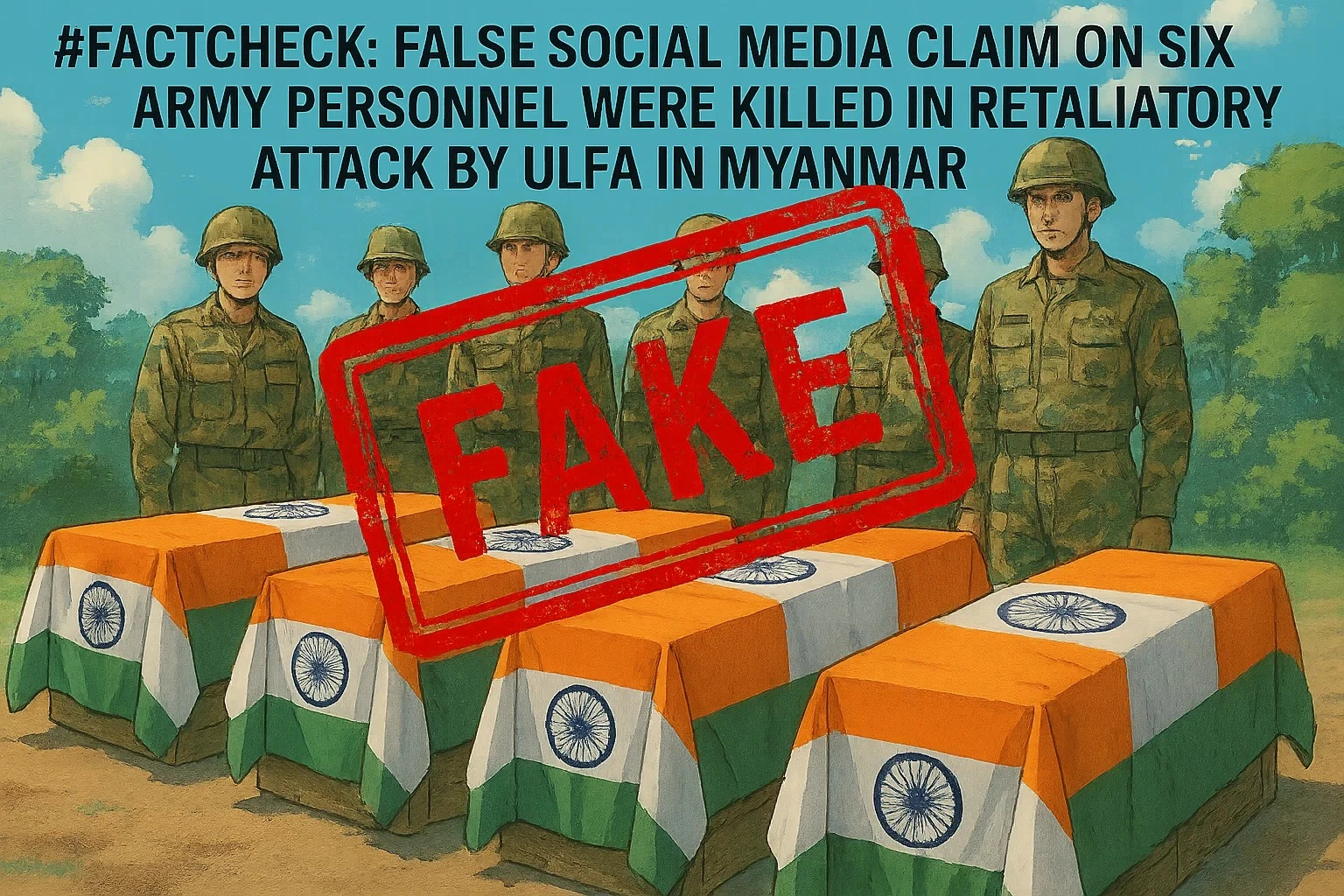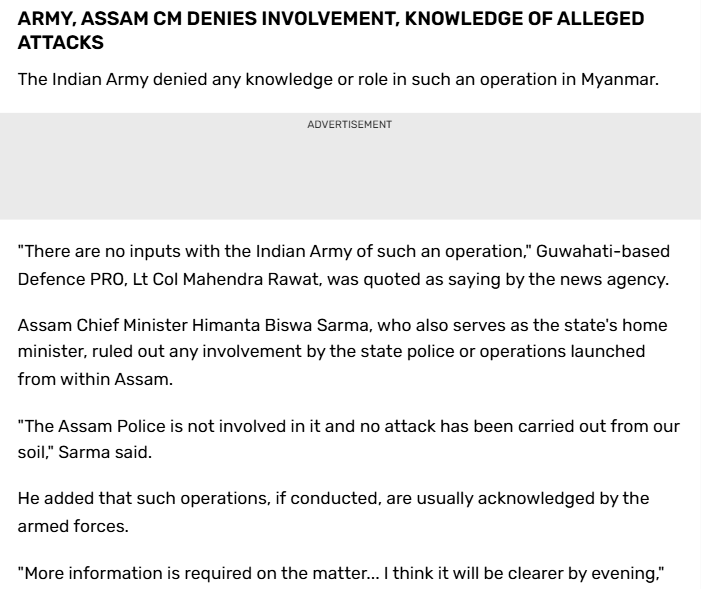#FactCheck - Viral Images of Indian Army Eating Near Border area Revealed as AI-Generated Fabrication
Executive Summary:
The viral social media posts circulating several photos of Indian Army soldiers eating their lunch in the extremely hot weather near the border area in Barmer/ Jaisalmer, Rajasthan, have been detected as AI generated and proven to be false. The images contain various faults such as missing shadows, distorted hand positioning and misrepresentation of the Indian flag and soldiers body features. The various AI generated tools were also used to validate the same. Before sharing any pictures in social media, it is necessary to validate the originality to avoid misinformation.




Claims:
The photographs of Indian Army soldiers having their lunch in extreme high temperatures at the border area near to the district of Barmer/Jaisalmer, Rajasthan have been circulated through social media.




Fact Check:
Upon the study of the given images, it can be observed that the images have a lot of similar anomalies that are usually found in any AI generated image. The abnormalities are lack of accuracy in the body features of the soldiers, the national flag with the wrong combination of colors, the unusual size of spoon, and the absence of Army soldiers’ shadows.




Additionally it is noticed that the flag on Indian soldiers’ shoulder appears wrong and it is not the traditional tricolor pattern. Another anomaly, soldiers with three arms, strengtheness the idea of the AI generated image.
Furthermore, we used the HIVE AI image detection tool and it was found that each photo was generated using an Artificial Intelligence algorithm.


We also checked with another AI Image detection tool named Isitai, it was also found to be AI-generated.


After thorough analysis, it was found that the claim made in each of the viral posts is misleading and fake, the recent viral images of Indian Army soldiers eating food on the border in the extremely hot afternoon of Badmer were generated using the AI Image creation tool.
Conclusion:
In conclusion, the analysis of the viral photographs claiming to show Indian army soldiers having their lunch in scorching heat in Barmer, Rajasthan reveals many anomalies consistent with AI-generated images. The absence of shadows, distorted hand placement, irregular showing of the Indian flag, and the presence of an extra arm on a soldier, all point to the fact that the images are artificially created. Therefore, the claim that this image captures real-life events is debunked, emphasizing the importance of analyzing and fact-checking before sharing in the era of common widespread digital misinformation.
- Claim: The photo shows Indian army soldiers having their lunch in extreme heat near the border area in Barmer/Jaisalmer, Rajasthan.
- Claimed on: X (formerly known as Twitter), Instagram, Facebook
- Fact Check: Fake & Misleading
Related Blogs

Executive Summary:
A video has gone viral that claims to show Hon'ble Minister of Home Affairs, Shri Amit Shah stating that the BJP-Led Central Government intends to end quotas for scheduled castes (SCs), scheduled tribes (STs), and other backward classes (OBCs). On further investigation, it turns out this claim is false as we found the original clip from an official source, while he delivered the speech at Telangana, Shah talked about falsehoods about religion-based reservations, with specific reference to Muslim reservations. It is a digitally altered video and thus the claim is false.

Claims:
The video which allegedly claims that the Hon'ble Minister of Home Affairs, Shri Amit Shah will be terminating the reservation quota systems of scheduled castes (SCs), scheduled tribes (STs) and other backward classes (OBCs) if BJP government was formed again has been viral on social media platforms.

English Translation: If the BJP government is formed again we will cancel ST, SC reservations: Hon'ble Minister of Home Affairs, Shri Amit Shah


Fact Check:
When the video was received we closely observed the name of the news media channel, and it was V6 News. We divided the video into keyframes and reverse searched the images. For one of the keyframes of the video, we found a similar video with the caption “Union Minister Amit Shah Comments Muslim Reservations | V6 Weekend Teenmaar” uploaded by the V6 News Telugu’s verified Youtube channel on April 23, 2023. Taking a cue from this, we also did some keyword searches to find any relevant sources. In the video at the timestamp of 2:38, Hon'ble Minister of Home Affairs, Shri Amit Shah talks about religion-based reservations calling ‘unconstitutional Muslim Reservation’ and that the Government will remove it.

Further, he talks about the SC, ST, and OBC reservations having full rights for quota but not the Muslim reservation.
While doing the reverse image, we found many other videos uploaded by other media outlets like ANI, Hindustan Times, The Economic Times, etc about ending Muslim reservations from Telangana state, but we found no such evidence that supports the viral claim of removing SC, ST, OBC quota system. After further analysis for any sign of alteration, we found that the viral video was edited while the original information is different. Hence, it’s misleading and false.
Conclusion:
The video featuring the Hon'ble Minister of Home Affairs, Shri Amit Shah announcing that they will remove the reservation quota system of SC, ST and OBC if the new BJP government is formed again in the ongoing Lok sabha election, is debunked. After careful analysis, it was found that the video was fake and was created to misrepresent the actual statement of Hon'ble Minister of Home Affairs, Shri Amit Shah. The original footage surfaced on the V6 News Telugu YouTube channel, in which Hon'ble Minister of Home Affairs, Shri Amit Shah was explaining about religion-based reservations, particularly Muslim reservations in Telangana. Unfortunately, the fake video was false and Hon'ble Minister of Home Affairs, Shri Amit Shah did not mention the end of SC, ST, and OBC reservations.
- Claim: The viral video covers the assertion of Hon'ble Minister of Home Affairs, Shri Amit Shah that the BJP government will soon remove reservation quotas for scheduled castes (SCs), scheduled tribes (STs), and other backward classes (OBCs).
- Claimed on: X (formerly known as Twitter)
- Fact Check: Fake & Misleading

Executive Summary:
A widely circulated claim on social media indicates that six soldiers of the Assam Rifles were killed during a retaliatory attack carried out by a Myanmar-based breakaway faction of the United Liberation Front of Asom (Independent), or ULFA (I). The post included a photograph of coffins covered in Indian flags with reference to soldiers who were part of the incident where ULFA (I) killed six soldiers. The post was widely shared, however, the fact-check confirms that the photograph is old, not related, and there are no trustworthy reports to indicate that any such incident took place. This claim is therefore false and misleading.

Claim:
Social media users claimed that the banned militant outfit ULFA (I) killed six Assam Rifles personnel in retaliation for an alleged drone and missile strike by Indian forces on their camp in Myanmar with captions on it “Six Indian Army Assam Rifles soldiers have reportedly been killed in a retaliatory attack by the Myanmar-based ULFA group.”. The claim was accompanied by a viral post showing coffins of Indian soldiers, which added emotional weight and perceived authenticity to the narrative.

Fact Check:
We began our research with a reverse image search of the image of coffins in Indian flags, which we saw was shared with the viral claim. We found the image can be traced to August 2013. We found the traces in The Washington Post, which confirms the fact that the viral snap is from the Past incident where five Indian Army soldiers were killed by Pakistani intruders in Poonch, Jammu, and Kashmir, on August 6, 2013.

Also, The Hindu and India Today offered no confirmation of the death of six Assam Rifles personnel. However, ULFA (I) did issue a statement dated July 13, 2025, claiming that three of its leaders had been killed in a drone strike by Indian forces.

However, by using Shutterstock, it depicts that the coffin's image is old and not representative of any current actions by the United Liberation Front of Asom (ULFA).

The Indian Army denied it, with Defence PRO Lt Col Mahendra Rawat telling reporters there were "no inputs" of such an operation. Assam Chief Minister Himanta Biswa Sarma also rejected that there was cross-border military action whatsoever. Therefore, the viral claim is false and misleading.

Conclusion:
The assertion that ULFA (I) killed six soldiers from the 6th Assam Rifles in a retaliation strike is incorrect. The viral image used in these posts is from 2013 in Jammu & Kashmir and has no relevance to the present. There have been no verified reports of any such killings, and both the Indian Army and the Assam government have categorically denied having conducted or knowing of any cross-border operation. This faulty narrative is circulating, and it looks like it is only inciting fear and misinformation therefore, please ignore it.
- Claim: Report confirms the death of six Assam Rifles personnel in an ULFA-led attack.
- Claimed On: Social Media
- Fact Check: False and Misleading

The race for global leadership in AI is in full force. As China and the US emerge as the ‘AI Superpowers’ in the world, the world grapples with the questions around AI governance, ethics, regulation, and safety. Some are calling this an ‘AI Arms Race.’ Most of the applications of these AI systems are in large language models for commercial use or military applications. Countries like Germany, Japan, France, Singapore, and India are now participating in this race and are not mere spectators.
The Government of India’s Ministry of Electronics and Information Technology (MeitY) has launched the IndiaAI Mission, an umbrella program for the use and development of AI technology. This MeitY initiative lays the groundwork for supporting an array of AI goals for the country. The government has allocated INR 10,300 crore for this endeavour. This mission includes pivotal initiatives like the IndiaAI Compute Capacity, IndiaAI Innovation Centre (IAIC), IndiaAI Datasets Platform, IndiaAI Application Development Initiative, IndiaAI FutureSkills, IndiaAI Startup Financing, and Safe & Trusted AI.
There are several challenges and opportunities that India will have to navigate and capitalize on to become a significant player in the global AI race. The various components of India’s ‘AI Stack’ will have to work well in tandem to create a robust ecosystem that yields globally competitive results. The IndiaAI mission focuses on building large language models in vernacular languages and developing compute infrastructure. There must be more focus on developing good datasets and research as well.
Resource Allocation and Infrastructure Development
The government is focusing on building the elementary foundation for AI competitiveness. This includes the procurement of AI chips and compute capacity, about 10,000 graphics processing units (GPUs), to support India’s start-ups, researchers, and academics. These GPUs have been strategically distributed, with 70% being high-end newer models and the remaining 30% comprising lower-end older-generation models. This approach ensures that a robust ecosystem is built, which includes everything from cutting-edge research to more routine applications. A major player in this initiative is Yotta Data Services, which holds the largest share of 9,216 GPUs, including 8,192 Nvidia H100s. Other significant contributors include Amazon AWS's managed service providers, Jio Platforms, and CtrlS Datacenters.
Policy Implications: Charting a Course for Tech Sovereignty and Self-reliance
With this government initiative, there is a concerted effort to develop indigenous AI models and reduce tech dependence on foreign players. There is a push to develop local Large Language Models and domain-specific foundational models, creating AI solutions that are truly Indian in nature and application. Many advanced chip manufacturing takes place in Taiwan, which has a looming China threat. India’s focus on chip procurement and GPUs speaks to a larger agenda of self-reliance and sovereignty, keeping in mind the geopolitical calculus. This is an important thing to focus on, however, it must not come at the cost of developing the technological ‘know-how’ and research.
Developing AI capabilities at home also has national security implications. When it comes to defence systems, control over AI infrastructure and data becomes extremely important. The IndiaAI Mission will focus on safe and trusted AI, including developing frameworks that fit the Indian context. It has to be ensured that AI applications align with India's security interests and can be confidently deployed in sensitive defence applications.
The big problem here to solve here is the ‘data problem.’ There must be a focus on developing strategies to mitigate the data problem that disadvantages the Indian AI ecosystem. Some data problems are unique to India, such as generating data in local languages. While other problems are the ones that appear in every AI ecosystem development lifecycle namely generating publicly available data and licensed data. India must strengthen its ‘Digital Public Infrastructure’ and data commons across sectors and domains.
India has proposed setting up the India Data Management Office to serve as India’s data regulator as part of its draft National Data Governance Framework Policy. The MeitY IndiaAI expert working group report also talked about operationalizing the India Datasets Platform and suggested the establishment of data management units within each ministry.
Economic Impact: Growth and Innovation
The government’s focus on technology and industry has far-reaching economic implications. There is a push to develop the AI startup ecosystem in the country. The IndiaAI mission heavily focuses on inviting ideas and projects under its ambit. The investments will strengthen the IndiaAI startup financing system, making it easier for nascent AI businesses to obtain capital and accelerate their development from product to market. Funding provisions for industry-led AI initiatives that promote social impact and stimulate innovation and entrepreneurship are also included in the plan. The government press release states, "The overarching aim of this financial outlay is to ensure a structured implementation of the IndiaAI Mission through a public-private partnership model aimed at nurturing India’s AI innovation ecosystem.”
The government also wants to establish India as a hub for sustainable AI innovation and attract top AI talent from across the globe. One crucial aspect that needs to be worked on here is fostering talent and skill development. India has a unique advantage, that is, top-tier talent in STEM fields. Yet we suffer from a severe talent gap that needs to be addressed on a priority basis. Even though India is making strides in nurturing AI talents, out-migration of tech talent is still a reality. Once the hardware manufacturing “goods-side” of economics transitions to service delivery in the field of AI globally, India will need to be ready to deploy its talent. Several structural and policy interfaces, like the New Education Policy and industry-academic partnership frameworks, allow India to capitalize on this opportunity.
India’s talent strategy must be robust and long-term, focusing heavily on multi-stakeholder engagement. The government has a pivotal role here by creating industry-academia interfaces and enabling tech hubs and innovation parks.
India's Position in the Global AI Race
India’s foreign policy and geopolitical standpoint have been one of global cooperation. This must not change when it comes to AI. Even though this has been dubbed as the “AI Arms Race,” India should encourage worldwide collaboration on AI R&D through collaboration with other countries in order to strengthen its own capabilities. India must prioritise more significant open-source AI development, work with the US, Europe, Australia, Japan, and other friendly countries to prevent the unethical use of AI and contribute to the formation of a global consensus on the boundaries for AI development.
The IndiaAI Mission will have far-reaching implications for India’s diplomatic and economic relations. The unique proposition that India comes with is its ethos of inclusivity, ethics, regulation, and safety from the get-go. We should keep up the efforts to create a powerful voice for the Global South in AI. The IndiaAI Mission marks a pivotal moment in India's technological journey. Its success could not only elevate India's status as a tech leader but also serve as a model for other nations looking to harness the power of AI for national development and global competitiveness. In conclusion, the IndiaAI Mission seeks to strengthen India's position as a global leader in AI, promote technological independence, guarantee the ethical and responsible application of AI, and democratise the advantages of AI at all societal levels.
References
- Ashwini Vaishnaw to launch IndiaAI portal, 10 firms to provide 14,000 GPUs. (2025, February 17). https://www.business-standard.com/. Retrieved February 25, 2025, from https://www.business-standard.com/industry/news/indiaai-compute-portal-ashwini-vaishnaw-gpu-artificial-intelligence-jio-125021700245_1.html
- Global IndiaAI Summit 2024 being organized with a commitment to advance responsible development, deployment and adoption of AI in the country. (n.d.). https://pib.gov.in/PressReleaseIframePage.aspx?PRID=2029841
- India to Launch AI Compute Portal, 10 Firms to Supply 14,000 GPUs. (2025, February 17). apacnewsnetwork.com. https://apacnewsnetwork.com/2025/02/india-to-launch-ai-compute-portal-10-firms-to-supply-14000-gpus/
- INDIAai | Pillars. (n.d.). IndiaAI. https://indiaai.gov.in/
- IndiaAI Innovation Challenge 2024 | Software Technology Park of India | Ministry of Electronics & Information Technology Government of India. (n.d.). http://stpi.in/en/events/indiaai-innovation-challenge-2024
- IndiaAI Mission To Deploy 14,000 GPUs For Compute Capacity, Starts Subsidy Plan. (2025, February 17). www.businessworld.in. Retrieved February 25, 2025, from https://www.businessworld.in/article/indiaai-mission-to-deploy-14000-gpus-for-compute-capacity-starts-subsidy-plan-548253
- India’s interesting AI initiatives in 2024: AI landscape in India. (n.d.). IndiaAI. https://indiaai.gov.in/article/india-s-interesting-ai-initiatives-in-2024-ai-landscape-in-india
- Mehra, P. (2025, February 17). Yotta joins India AI Mission to provide advanced GPU, AI cloud services. Techcircle. https://www.techcircle.in/2025/02/17/yotta-joins-india-ai-mission-to-provide-advanced-gpu-ai-cloud-services/
- IndiaAI 2023: Expert Group Report – First Edition. (n.d.). IndiaAI. https://indiaai.gov.in/news/indiaai-2023-expert-group-report-first-edition
- Satish, R., Mahindru, T., World Economic Forum, Microsoft, Butterfield, K. F., Sarkar, A., Roy, A., Kumar, R., Sethi, A., Ravindran, B., Marchant, G., Google, Havens, J., Srichandra (IEEE), Vatsa, M., Goenka, S., Anandan, P., Panicker, R., Srivatsa, R., . . . Kumar, R. (2021). Approach Document for India. In World Economic Forum Centre for the Fourth Industrial Revolution, Approach Document for India [Report]. https://www.niti.gov.in/sites/default/files/2021-02/Responsible-AI-22022021.pdf
- Stratton, J. (2023, August 10). Those who solve the data dilemma will win the A.I. revolution. Fortune. https://fortune.com/2023/08/10/workday-data-ai-revolution/
- Suri, A. (n.d.). The missing pieces in India’s AI puzzle: talent, data, and R&D. Carnegie Endowment for International Peace. https://carnegieendowment.org/research/2025/02/the-missing-pieces-in-indias-ai-puzzle-talent-data-and-randd?lang=en
- The AI arms race. (2024, February 13). Financial Times. https://www.ft.com/content/21eb5996-89a3-11e8-bf9e-8771d5404543


